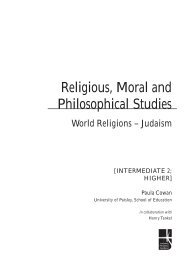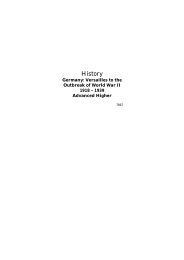Bertolt Brecht - Education Scotland
Bertolt Brecht - Education Scotland
Bertolt Brecht - Education Scotland
You also want an ePaper? Increase the reach of your titles
YUMPU automatically turns print PDFs into web optimized ePapers that Google loves.
8<br />
THE TOP TEN<br />
<strong>Brecht</strong>, Willett argues, is primarily an anti-Expressionist (pp73–86). These<br />
pages look at <strong>Brecht</strong>’s links with cabaret and the sexual urgings found in<br />
Wedekind, Expressionism’s influence on <strong>Brecht</strong> and <strong>Brecht</strong>’s distance from<br />
this movement.<br />
The discussion of <strong>Brecht</strong> and Piscator (pp87–106) is valuable for its<br />
delineation of their agreements and disagreements. It also gives further<br />
evidence – if it be needed – of the collaborative nature of this radical form of<br />
theatre, with writers working together on plays, revisions, translations and<br />
adaptations. The documentary style of presentation, epic, montage, use of<br />
film, non-Western techniques and the influence of <strong>Brecht</strong>’s Moscow trip on<br />
acting techniques are all to be found in this section of the book.<br />
Light is thrown on <strong>Brecht</strong>’s obsession with crime novels and cinema (pp107–<br />
128) and its link with Arturo Ui; and on <strong>Brecht</strong>’s attitude to filming and his<br />
work on Pabst’s film of The Threepenny Opera (1931) and the semidocumentary<br />
Kuhle Wampe (1932).<br />
Chapter 8 deals with the visual arts: montage; collaborations with George<br />
Grosz and Piscator (on The Good Soldier Svejk), and Caspar Neher.<br />
Music is examined in Chapter 9 – its gestation in his own poetry and on to his<br />
love of ballads and cabaret; through to his collaborations with Weill, Eisler<br />
and Dessau (among others), and his interest in new musical movements.<br />
‘Two political excursions: b: <strong>Brecht</strong>, Alienation and Karl Marx’ (pp218–221)<br />
should be positively the last word on the translation of the troublesome<br />
<strong>Brecht</strong>ian term Verfremdung. It should provide everybody with the strongest<br />
reasons never to use the term ‘alienation’ again when discussing the work of<br />
<strong>Brecht</strong>. My own term of choice is ‘distancing’, though others will prefer one<br />
of the variety on offer, such as ‘estrangement’or ‘de-familiarisation’.<br />
Finally, and crucially, the closing chapter’s ‘after-notes’ are Willett’s notes on<br />
some of the productions he has seen over the years: The Threepenny Opera<br />
(Prague 1945); Mother Courage and Her Children (Munich 1949); The<br />
Caucasian Chalk Circle (Paris 1955); The Life of Galileo (East Berlin 1957) and<br />
The Resistible Rise of Arturo Ui (Paris 1960). These first-hand appreciations<br />
contain marvellous insights into their direction and the use of space and<br />
theatre arts. Not to be missed.<br />
Needle, Jan, and Thomson, Peter, <strong>Brecht</strong>, Oxford: Basil Blackwell, 1981<br />
This is another extremely good book, scholarly but very accessible for<br />
Advanced Higher students.<br />
DRAMA

















